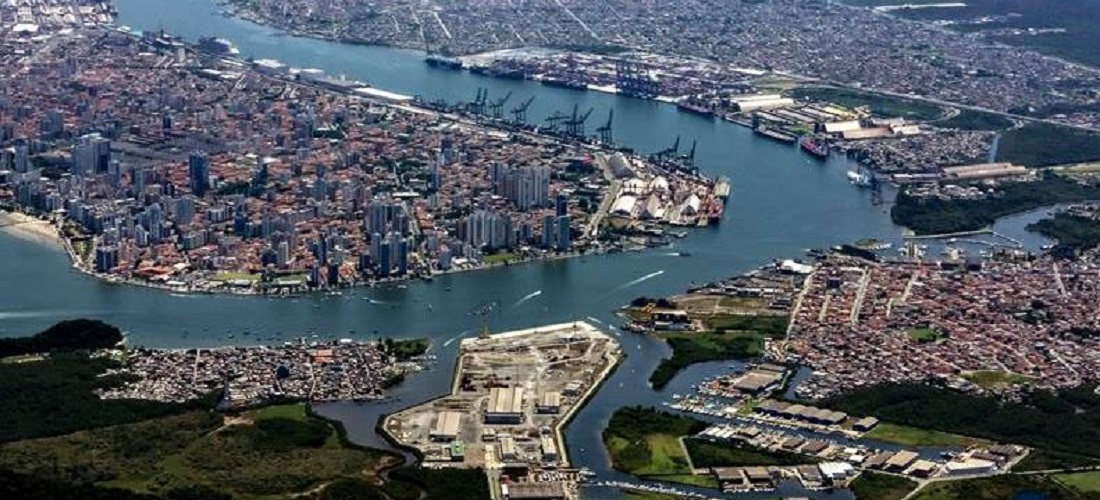
The impact of climate change on Brazilian ports: challenges and uncertainties
Sep, 27, 2023 Posted by Gabriel MalheirosWeek 202339
The world is closely monitoring climate change. Extreme events such as heatwaves, storms, and increasing wind speeds are becoming more common. This not only affects the average citizen but also has a direct impact on ports worldwide, including the Port of Santos, the largest in the Southern Hemisphere, with dire economic repercussions.
On August 13th, strong winds, reaching about 70 km/h near Santos, caused two empty containers in a terminal’s yard to fall into the sea. One container was lifted from the water that same night, while the other remained submerged near Barnabé Island on the left bank of the Santos complex until the 15th.
“Climate-related issues can be unpredictable. The most we can do is conduct studies, monitor climate-related matters, and try to develop basic port infrastructure related to drainage and reservoirs for containing potential flooding, for example. When it comes to strong winds, our equipment has limited technology in this regard,” explained Renato Ferreira da Silva, the Environmental, Health, and Safety Manager at Brasil Terminal Portuário (BTP). He discussed the topic during the first meeting of the second edition of the ESG Agenda, held last Tuesday at the Grupo Tribuna auditorium.
One of these studies, titled “Impacts and Risks of Climate Change on Public Ports,” was approved in June this year by the National Waterway Transportation Agency (Antaq). The study, led by Antaq director Flávia Takafashi, is part of a partnership with the German Agency for International Cooperation (GIZ).
Three Brazilian ports were studied: Aratu (in Bahia), Rio Grande (Rio Grande do Sul), and Santos. According to the study’s findings, the three ports face risks of interrupted operations in the event of heavy rains. They also present risks, in the case of persistent rain, heavy rain, and flooding due to a 0.2-meter rise in sea level, exposing their infrastructure to harsh weather conditions, “resulting in high maintenance demands, increased costs, and reduced overall capacity.”
The study also revealed that the three ports lack organized and systematic historical data on structural damage; “therefore, there are no records of impacts on infrastructure and superstructures.” Furthermore, data on port operation interruptions were also limited, covering only a short period, which posed a significant limitation to the study.
“While risk assessments leave room for uncertainty about the magnitude of the impacts, this should not prevent the port from taking actions to manage risks related to future climate events,” notes the text indicating the climate risk survey results at the Port of Santos.
International Perspective
The perspective on climate change varies internationally. One of the guests at the recent ESG Agenda event, Ana Carolina Oliveira, Business Development Manager at WayCarbon, also addressed the issue from two angles. One is the rising sea level. “There is a noteworthy case in Europe, in the Netherlands if I’m not mistaken, where they are making infrastructure adjustments due to this.”
The other aspect is the economic aspect, based on her recent experience working for a large global Canadian group.
“Our main company had a specific protocol that assessed risks and economic feasibility and required an environmental, social, and governance evaluation. And what was the main environmental point of concern? Climate risk. We had to conduct future evaluations for all potential new acquisitions. Even if they didn’t know if they were going to make the purchase, they had to assess the climatic viability of that region to see if the investment made sense,” she explained.
Source: A Tribuna
To read the original news article, check: https://www.atribuna.com.br/noticias/portomar/portos-brasileiros-monitoram-riscos-de-mudancas-climaticas
-
Meat
May, 22, 2023
0
Brazilian poultry industry works to avoid trade embargoes amid avian influenza cases
-
Other Logistics
Apr, 24, 2019
0
ANTT publishes new freight rates
-
Ports and Terminals
Jun, 20, 2022
0
Suape to export more grains from Brazil’s northeast
-
Other Cargo
Dec, 22, 2021
0
Brazil to export dairy products to Mexico

